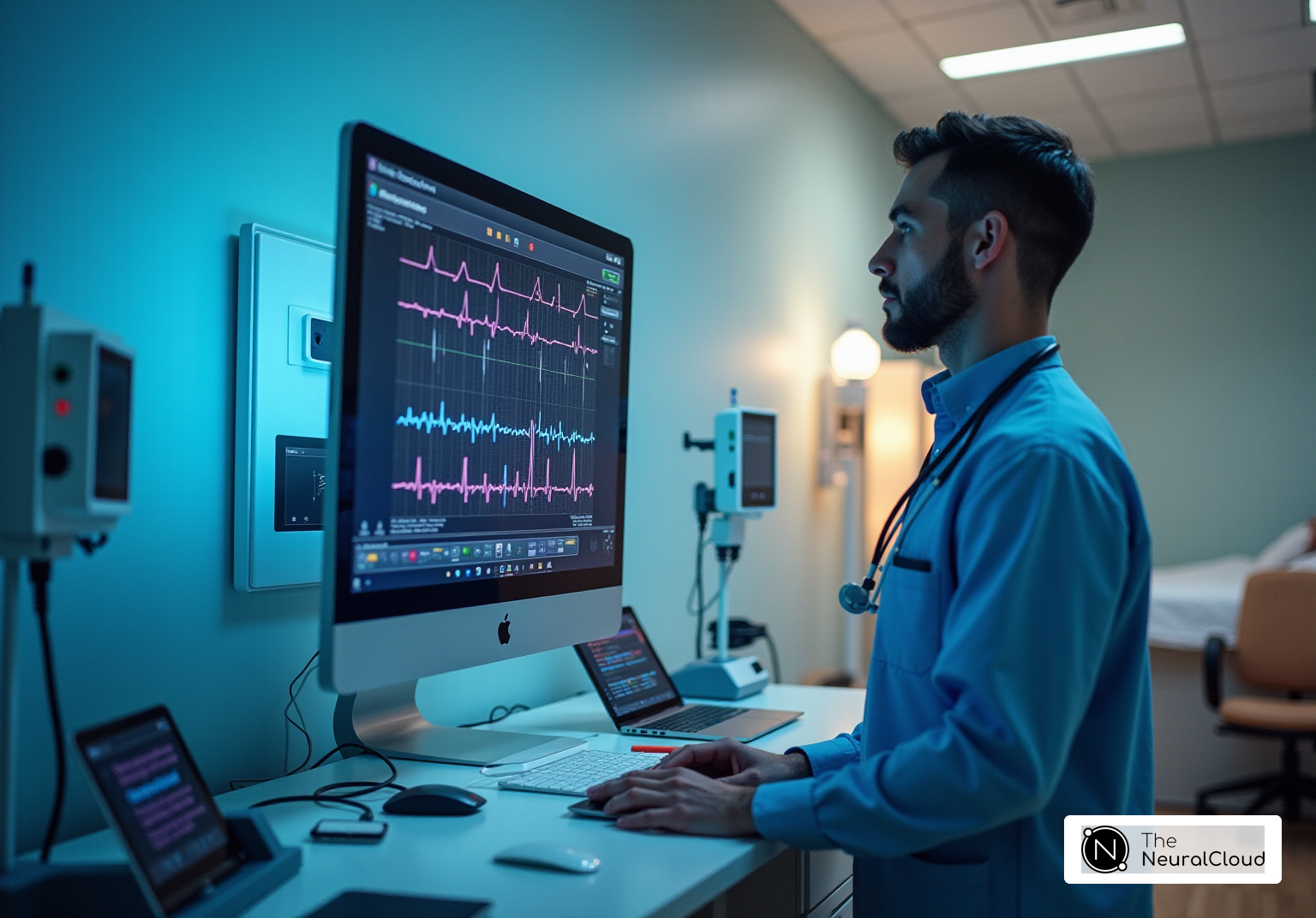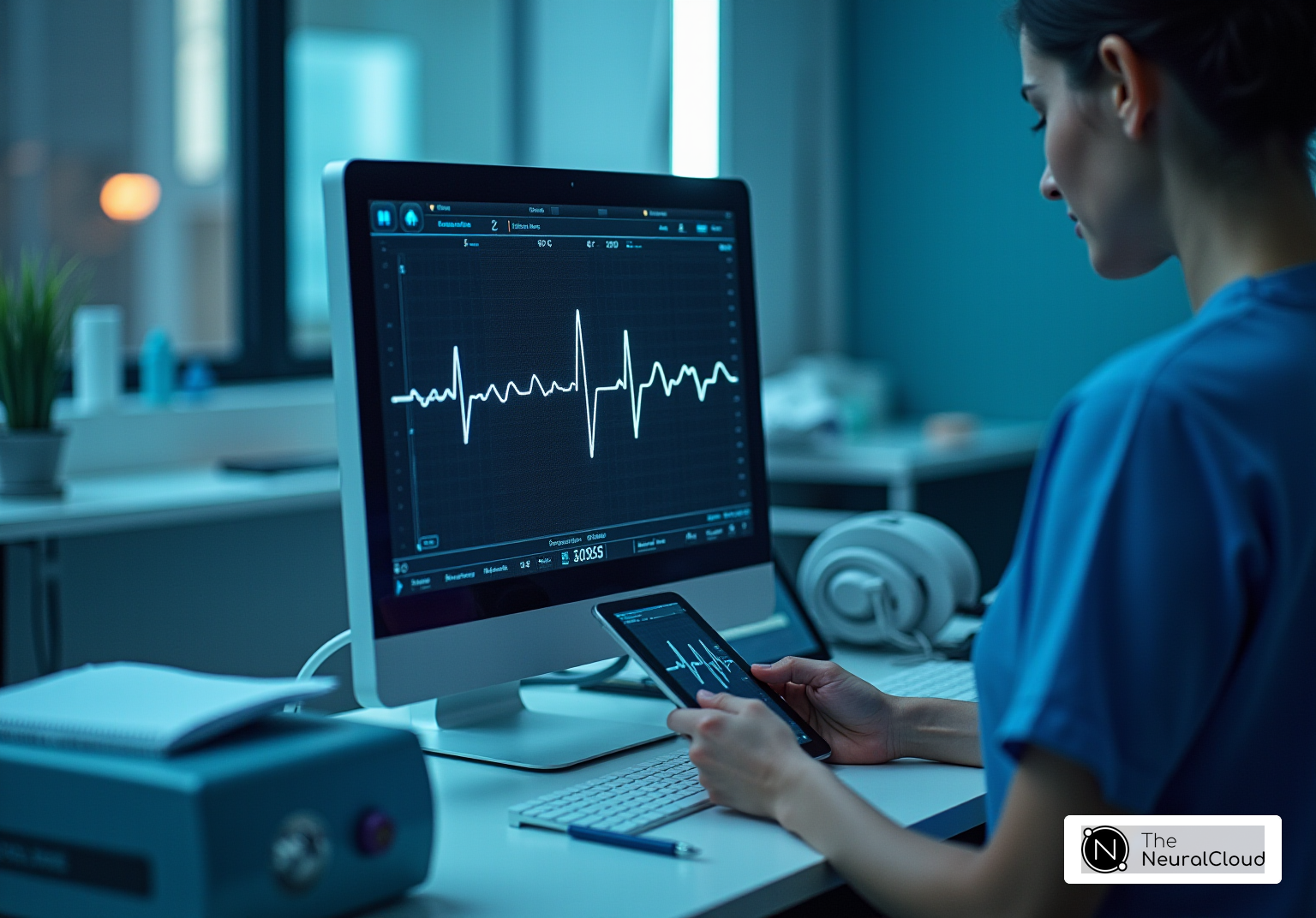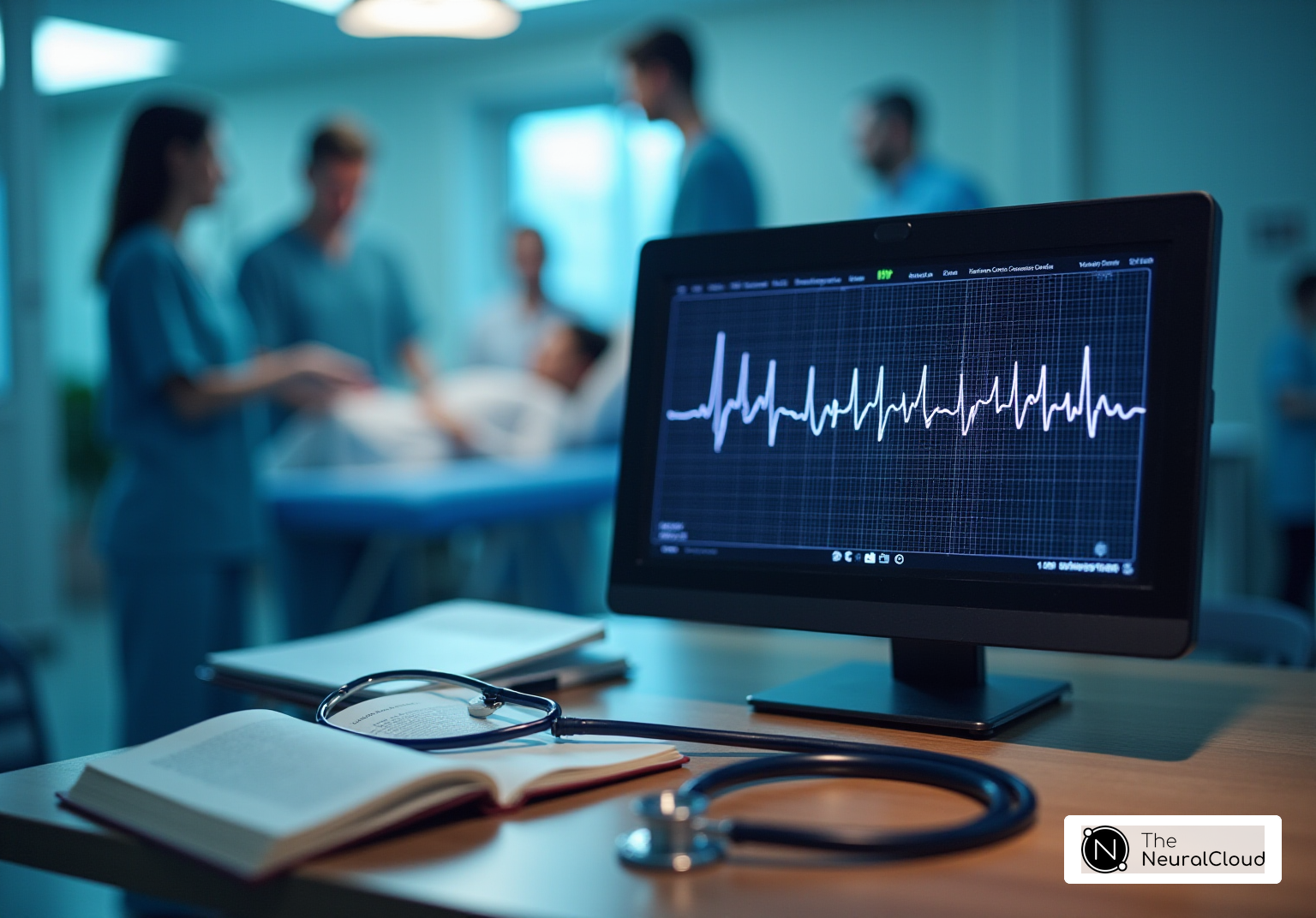Overview
The article examines the critical features that EKG apps must possess for health tech developers, highlighting functionalities that enhance ECG analysis and improve patient care. Key features include:
- Automated ECG analysis, which provides clarity.
- Real-time monitoring that facilitates timely interventions.
- User-friendly interfaces that promote efficient data interpretation.
- Robust data security measures that safeguard patient information.
Collectively, these elements aim to streamline cardiac care and enhance clinical outcomes.
Introduction
In the rapidly evolving landscape of healthcare technology, EKG apps have emerged as indispensable tools for monitoring cardiac health. These applications not only streamline the analysis of complex ECG data but also enhance patient care through innovative features. As developers strive to create effective solutions, understanding the essential functionalities that elevate EKG apps is crucial. Identifying the must-have features that can transform these applications into powerful allies for healthcare professionals is essential, ensuring timely interventions and improved patient outcomes.
Neural Cloud Solutions MaxYield™: Automated ECG Analysis for Enhanced Clarity
Neural Cloud Solutions' MaxYield™ platform is revolutionizing ECG analysis through automated interpretation, significantly enhancing the clarity of ECG signals. The platform effectively filters out noise and accurately labels critical features such as P-waves, QRS complexes, and T-wave intervals. This ensures that healthcare professionals receive reliable cardiac insights. MaxYield™ can process over 200,000 heartbeats in under five minutes using the EKG app, accelerating analysis and bolstering diagnostic accuracy. This makes it an , especially when using an EKG app focused on improving clinical outcomes.
The integration of AI in ECG analysis has proven to be a game-changer. AI-powered systems can detect 20 essential diagnostic patterns from standard 12-lead ECGs, surpassing traditional computerized interpretation methods in diagnostic performance. This advancement enables clinicians to identify high-risk cases more quickly, improving safety and treatment effectiveness. Cardiologists emphasize that clarity in ECG signals is paramount for accurate diagnosis. MaxYield™ exemplifies this principle by providing a streamlined, automated solution that prioritizes precision and efficiency in cardiac care.
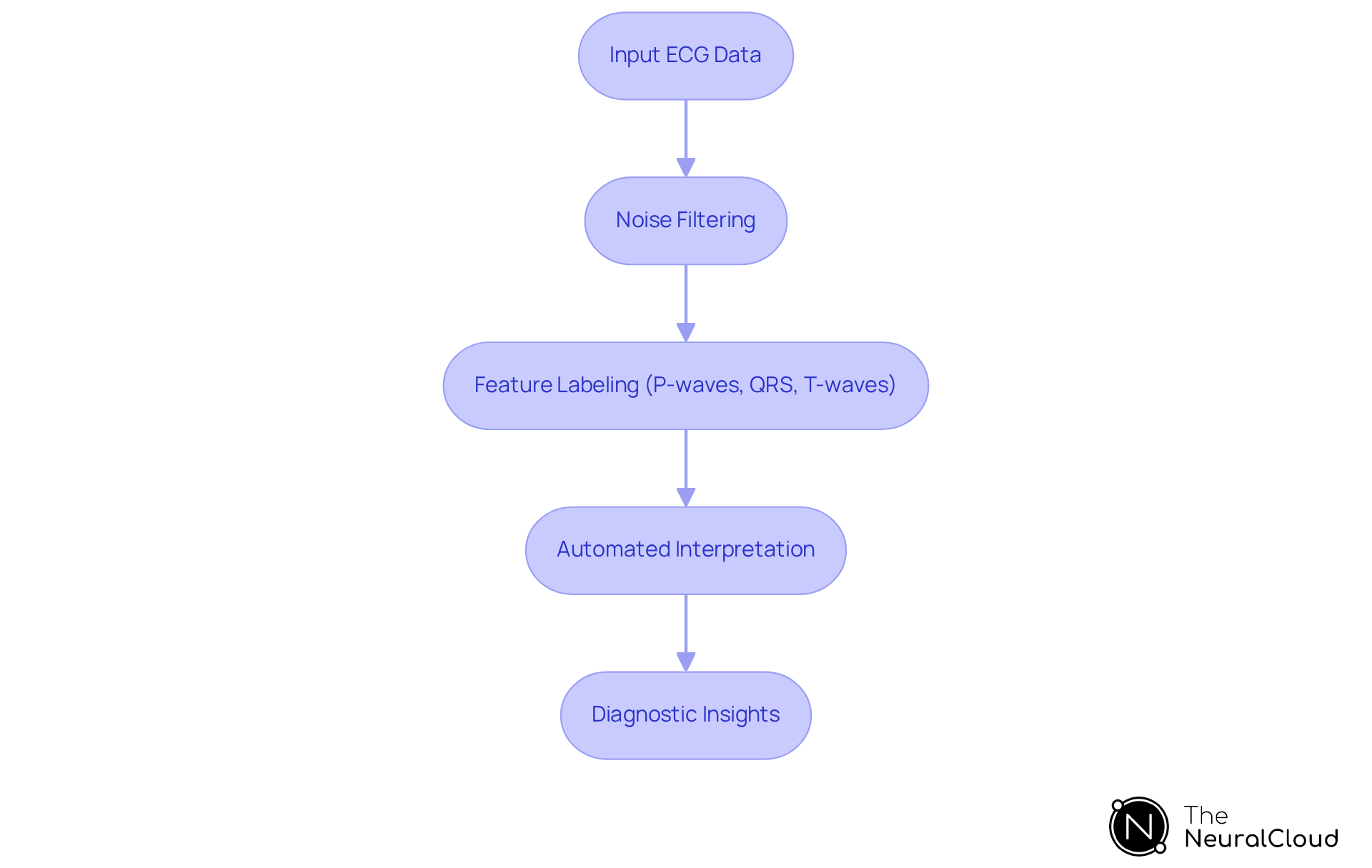
Real-Time Monitoring: Essential for Immediate Cardiac Insights
Real-time monitoring is a pivotal feature of the EKG app, offering immediate feedback on a patient's cardiac status. This capability is essential for the timely detection of arrhythmias and other abnormalities, allowing healthcare providers to intervene swiftly. Current trends in real-time ECG monitoring technology emphasize the integration of advanced data streaming, significantly enhancing application responsiveness.
By leveraging advanced noise filtering and distinct wave recognition technologies like MaxYield™, developers can transform lengthy and noisy ECG recordings into clean, crisp signals. This ensures are addressed promptly, improving outcomes for individuals. Additionally, the efficiency of ECG analysis is enhanced through automated labeling and continuous learning models, which streamline the review process.
Expert insights indicate that the ability to detect arrhythmias in real-time facilitates prompt clinical responses and empowers patients to engage more actively in their health management. Integrating various information types, including ECG and heart rate, is essential for delivering comprehensive cardiac insights, as emphasized by NHS users.
As the field of cardiac care progresses, the emphasis on real-time information streaming continues to influence the future of EKG apps. These advancements make the EKG app an essential tool in contemporary medical practice, ultimately benefiting both healthcare professionals and patients.
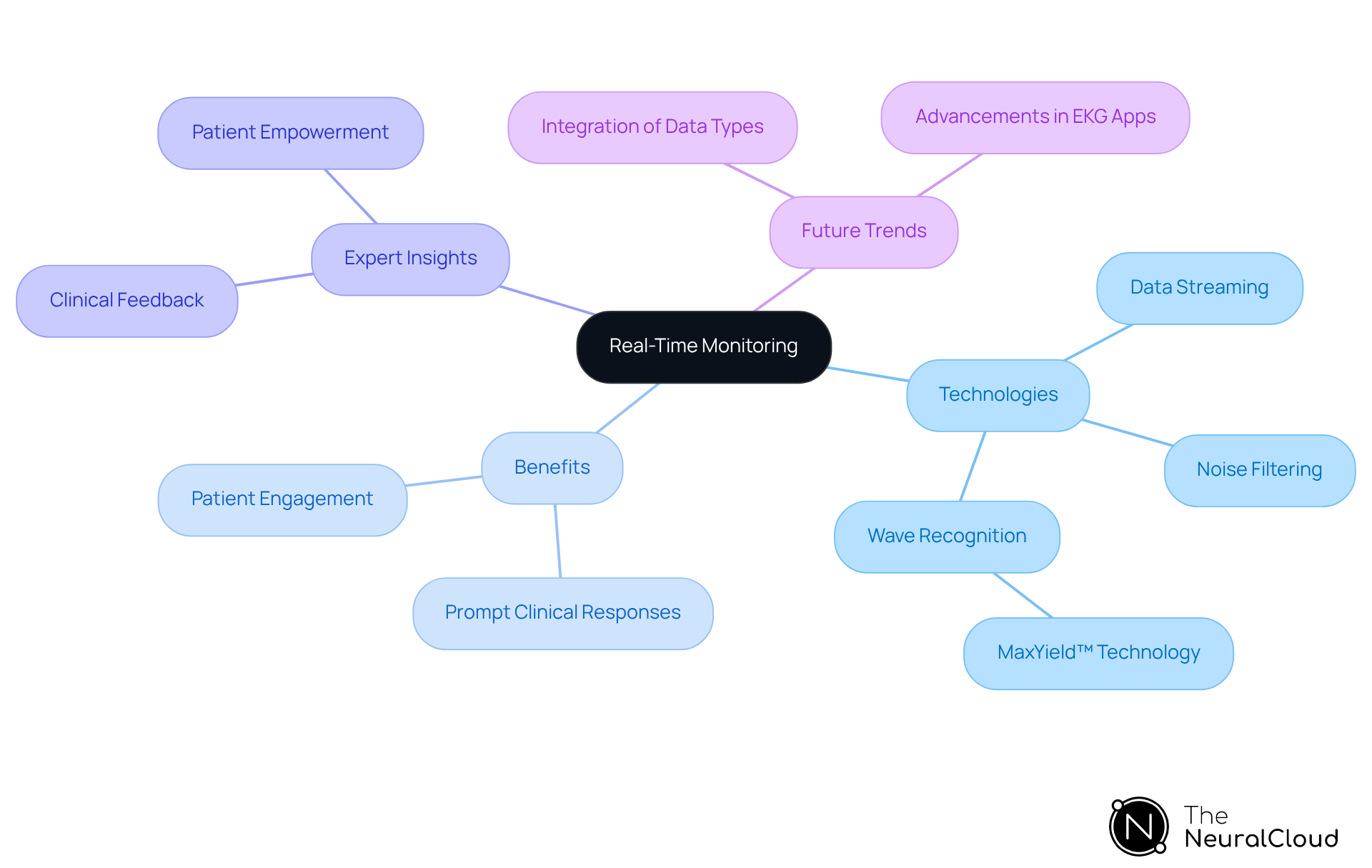
User-Friendly Interface: Streamlining ECG Data Interpretation
A user-friendly interface is essential in an EKG app, enabling healthcare professionals to easily navigate complex information. Key features of the EKG app include:
- Clear visualizations of ECG waveforms
- Intuitive navigation
- Customizable dashboards
All of which significantly enhance the user experience. By prioritizing usability, clinicians can reduce the time spent interpreting data, allowing them to focus more on making informed decisions regarding patient care. For example, studies indicate that an effective user interface can increase conversion rates by up to 400%, highlighting the critical role of design in medical software. Furthermore, straightforward navigation is vital for 94% of users, underscoring that well-structured interfaces can lead to greater clinician satisfaction and efficiency. By implementing best practices for visualizing ECG waveforms, developers can create an EKG app that supports accurate interpretation and fosters improved clinical outcomes.
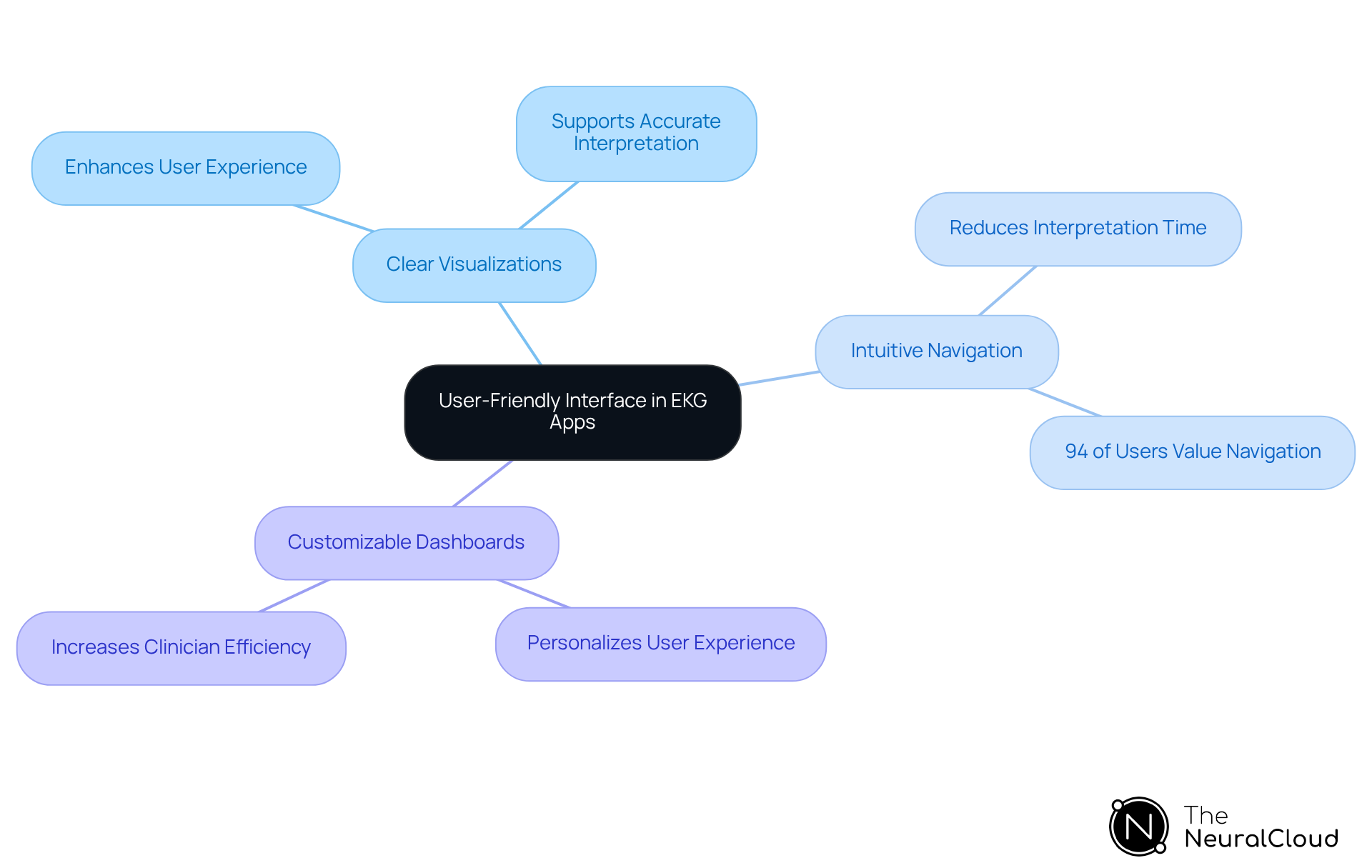
Comprehensive Reporting: Delivering Detailed ECG Analyses
The challenges in ECG analysis often stem from the complexity of cardiac data interpretation. Comprehensive reporting features in the EKG app facilitate detailed analyses, including historical comparisons and trend analyses. These reports can effectively highlight significant changes in a patient's heart rhythm over time, which is crucial for diagnosing and managing cardiac conditions.
Integrating MaxYield™ enhances these reporting capabilities by providing automated ECG analysis that adeptly maps signals through noise. This technology isolates and labels key features in every heartbeat, offering that generates insights from 200,000 heartbeats in under 5 minutes. Consequently, medical providers receive the most pertinent information for their practice, streamlining their workflow and improving patient care.
Additionally, MaxYield™ employs advanced noise filtering and adaptive algorithms, which significantly improve diagnostic yield. This allows for the salvage of previously obscured sections of recordings, ensuring that no critical data is overlooked. By incorporating customizable reporting options alongside the EKG app, MaxYield™, developers can tailor the platform to meet the specific needs of medical providers, enhancing the efficiency and precision of cardiac monitoring.
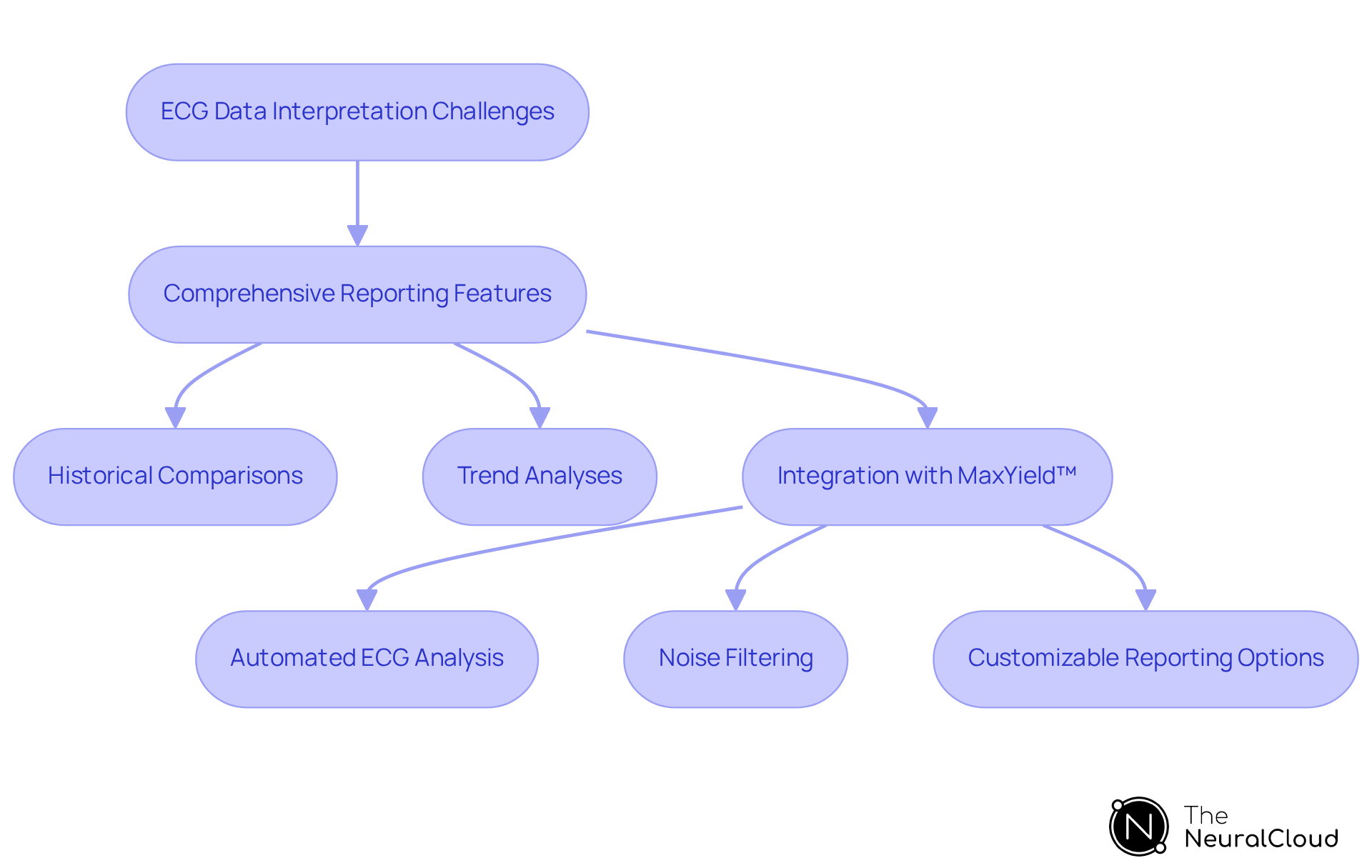
Integration with Healthcare Systems: Ensuring Seamless Data Management
Incorporating the EKG app with current medical systems, particularly Electronic Health Records (EHRs), is essential for efficient information management. This integration facilitates automatic uploads of information, ensuring that patient details remain current and easily accessible. By utilizing standardized protocols such as HL7 and FHIR, developers can enable seamless communication between ECG devices and healthcare systems, significantly enhancing workflow efficiency. The 'Neural Cloud Solutions' MaxYield™ platform simplifies this process through advanced noise filtering, automated signal processing, and the highlighting of P, QRS, and T Waves. This functionality allows for a clean, 'neuralized' signal and clear, beat-by-beat information wall. Such capabilities not only consolidate workflows but also enhance the accuracy and efficiency of ECG analysis, making it an invaluable tool for health tech developers.
The global ECG equipment and management systems market, valued at USD 7.82 billion in 2024, is projected to reach USD 13 billion by 2033, reflecting a growing demand for integrated solutions. Current trends indicate that hospitals and clinics are increasingly adopting advanced ECG devices, with the segment expected to grow at a CAGR of 5.8%. This shift underscores the significance of in enhancing individual outcomes and operational efficiency.
Furthermore, the EKG app allows for the synchronization of ECG information with EHRs, simplifying clinical processes and enabling medical professionals to make informed decisions based on comprehensive patient histories. As the healthcare landscape evolves, integrating the EKG app with EHR systems will be crucial in addressing issues of data silos and improving the overall quality of care. Additionally, employing frameworks such as the ABCD guide (accuracy, benefit, compatibility, and governance) can assist in evaluating the effectiveness of wearable ECG devices in clinical environments.
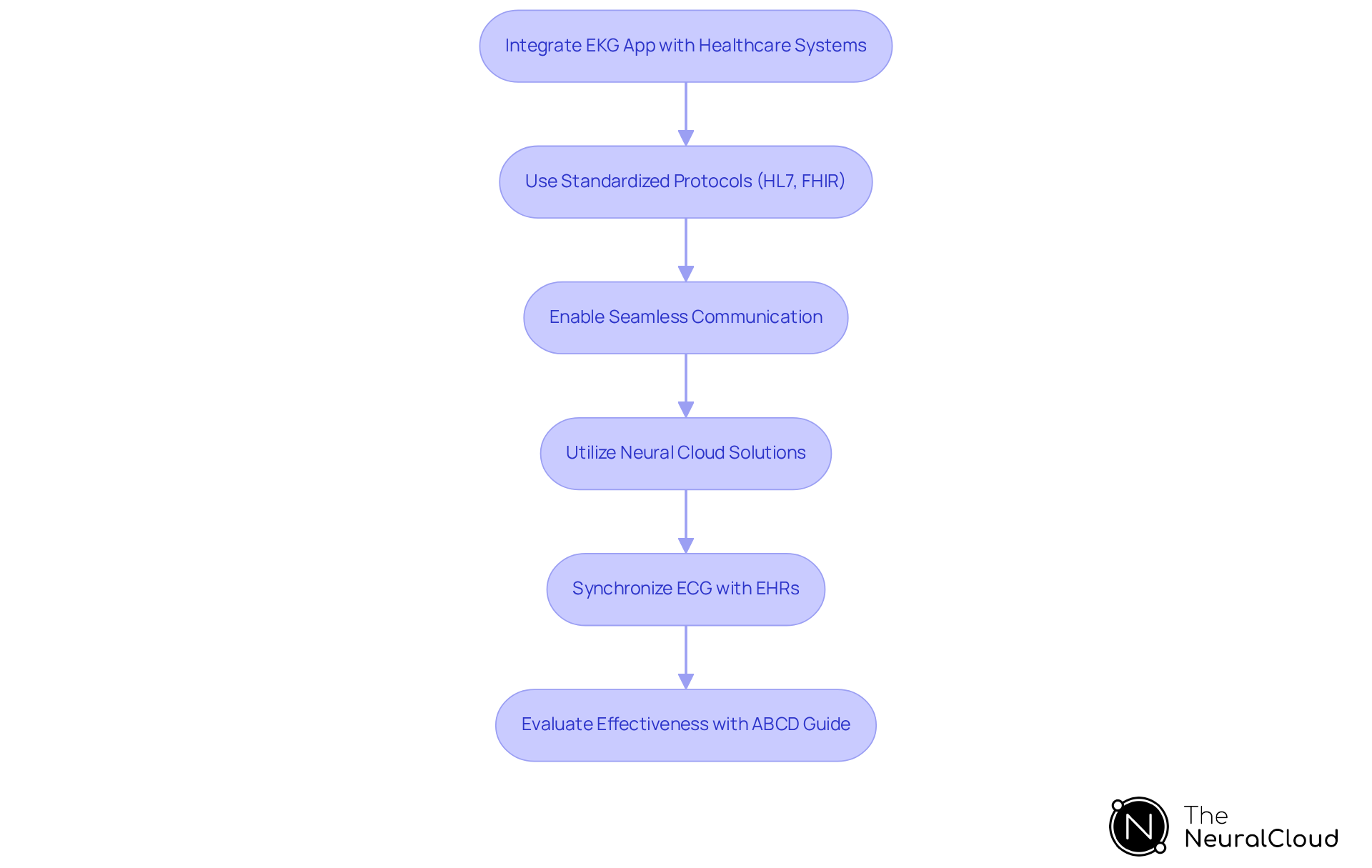
Data Security: Protecting Patient Information in EKG Apps
Data security in the EKG app is crucial for protecting individual information from unauthorized access and breaches. Developers are required to implement robust encryption methods, secure user authentication, and conduct regular security audits to protect sensitive data effectively.
Compliance with regulations such as HIPAA is essential, ensuring that individual information is handled with the utmost care and confidentiality. These measures not only but also foster trust among users and healthcare professionals, thereby enhancing the overall integrity of the EKG app.
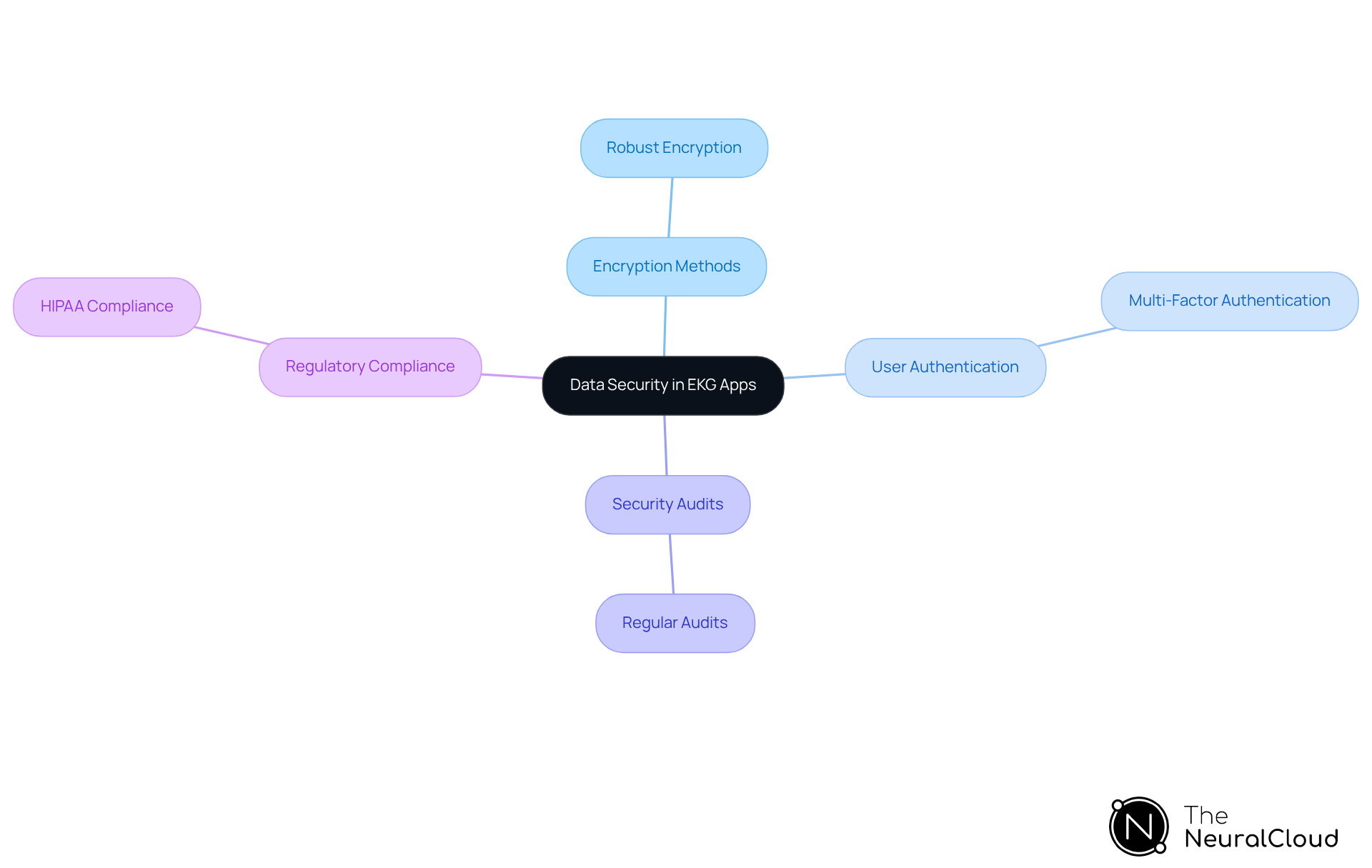
Customizable Alerts: Enhancing Responsiveness to Cardiac Events
Adjustable notifications in the EKG app empower medical professionals to set specific alert limits tailored to individual profiles. This feature allows for alerts configured for abnormal heart rates or irregular rhythms, ensuring that clinicians receive timely notifications of any concerning changes. The advantage of this capability lies in its enhancement of safety for patients, while also facilitating more personalized care by utilizing an EKG app that allows providers to adjust alert settings based on each person's unique requirements.
MaxYield™, developed by Neural Cloud Solutions, transforms lengthy and noisy ECG recordings into clean signals, further increasing the precision of these alerts. Medical professionals have noted that MaxYield™ significantly improves their ability to monitor patients effectively. The continuous learning model of MaxYield™ adapts over time, learning from each ECG analysis to refine alert accuracy and .
In summary, the integration of adjustable notifications and the advanced features of the EKG app MaxYield™ not only address the challenges inherent in ECG analysis but also provide substantial benefits for healthcare professionals. By ensuring accurate monitoring and personalized care, MaxYield™ represents a significant advancement in the field of cardiology.
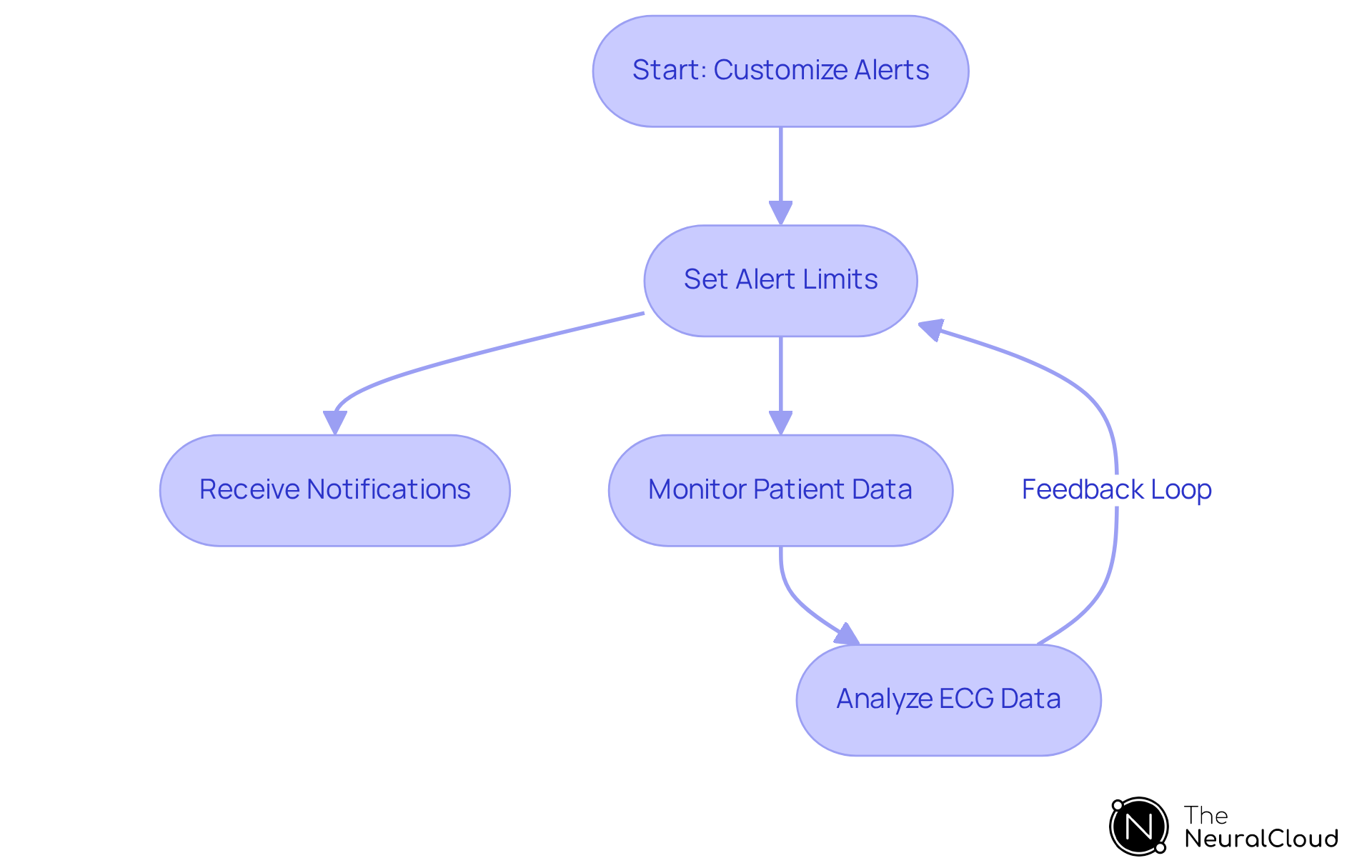
Educational Resources: Supporting Continuous Learning for Professionals
Integrating educational materials into the EKG app addresses significant challenges in ECG analysis, ultimately enhancing the knowledge base of medical professionals. These materials can encompass:
- Access to the latest research
- Tutorials on ECG interpretation
- Case studies that exemplify best practices
Leveraging Neural Cloud Solutions' MaxYield™ platform, developers can offer automated labeling and advanced AI-driven analysis. This not only enhances diagnostic yield but also cultivates a culture of continuous learning, aligning with our . By utilizing these resources, including the EKG app, clinicians can refine their skills and stay informed about advancements in cardiac care, leading to improved outcomes for patients. Furthermore, user manuals and specific use cases can effectively demonstrate how these resources can be applied in practice.
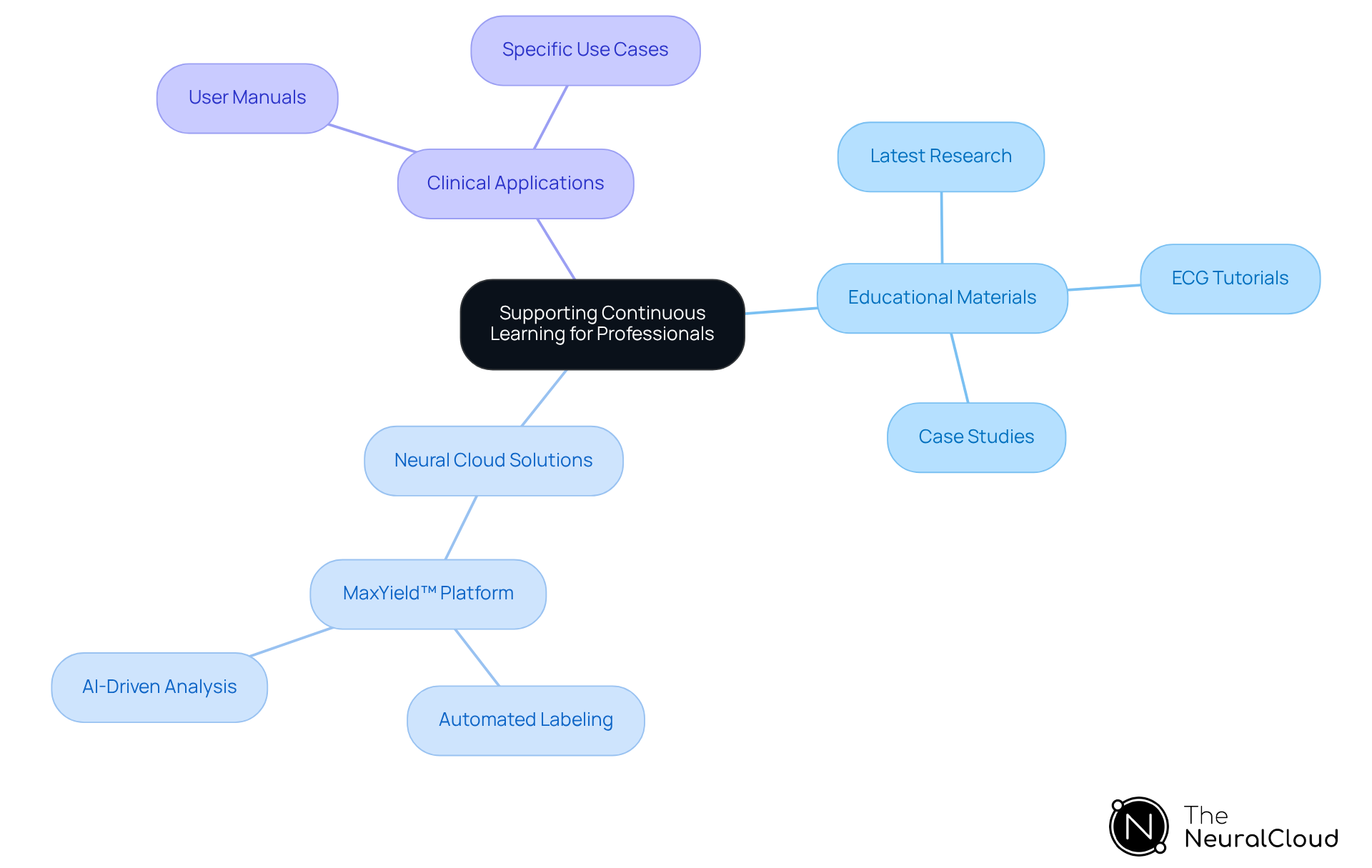
Cloud-Based Storage: Enabling Easy Access and Collaboration
Cloud-based storage solutions address the challenges in ECG analysis by enabling an EKG app to securely store and manage patient information while providing easy access for medical professionals. This capability facilitates real-time collaboration among clinicians, allowing them to share ECG information and reports instantly, irrespective of their location.
By leveraging cloud technology in conjunction with advanced solutions like Neural Cloud Solutions' MaxYield™, which automates repetitive tasks and enhances noise filtering, developers can significantly boost the efficiency of cardiac care delivery. This integration ensures that critical information is always accessible when needed, transforming lengthy and into clear, actionable insights.
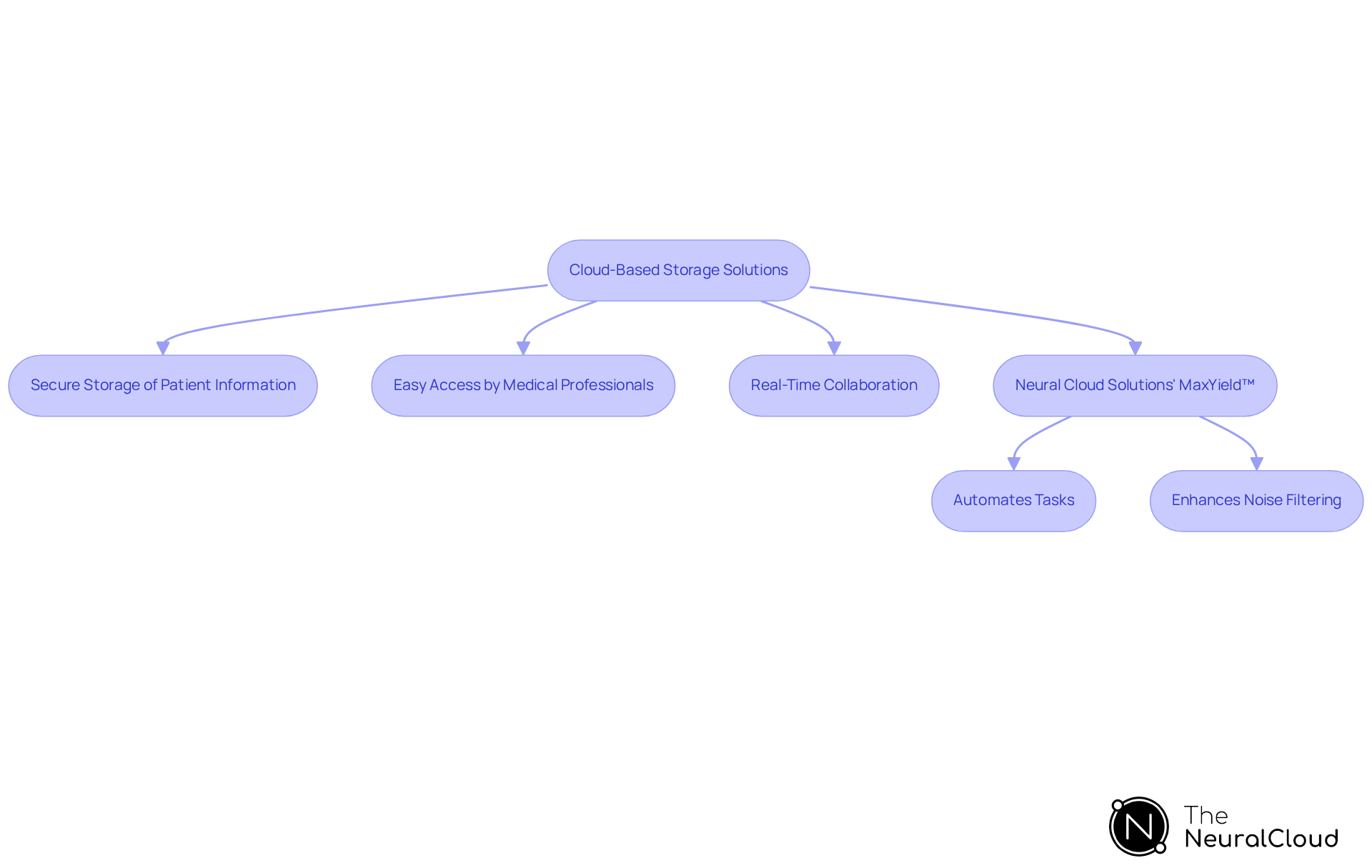
Multi-Device Compatibility: Flexibility for Healthcare Professionals
Multi-device compatibility is essential for ECG applications, enabling medical professionals to access and utilize the app across various devices, including smartphones, tablets, and computers. This flexibility allows clinicians to monitor and analyze ECG data using the EKG app in their preferred environments, whether in the clinic or remotely. By supporting a diverse range of devices, developers can significantly enhance user experience and broaden the app's applicability across various medical environments. Current trends indicate that over 83% of medical providers are utilizing telehealth services, underscoring the increasing need for flexible solutions that facilitate smooth monitoring and engagement of individuals.
This adaptability enhances accessibility for patients, particularly those in rural areas or with mobility challenges, while also streamlining workflows for medical professionals. Neural Cloud Solutions' MaxYield™ platform further improves this experience by integrating advanced noise filtering and distinct wave recognition. This functionality allows for , even in challenging conditions. By leveraging the continuous learning model of MaxYield™, developers can ensure that their applications evolve to meet the growing demands of healthcare providers.
In summary, the MaxYield™ platform addresses the challenges faced in ECG analysis by providing a robust solution that enhances both accessibility and accuracy. Its features, such as advanced noise filtering and wave recognition, offer significant advantages to healthcare professionals, ensuring that they can deliver high-quality care. As the landscape of telehealth continues to evolve, solutions like MaxYield™ will be pivotal in meeting the needs of both providers and patients.
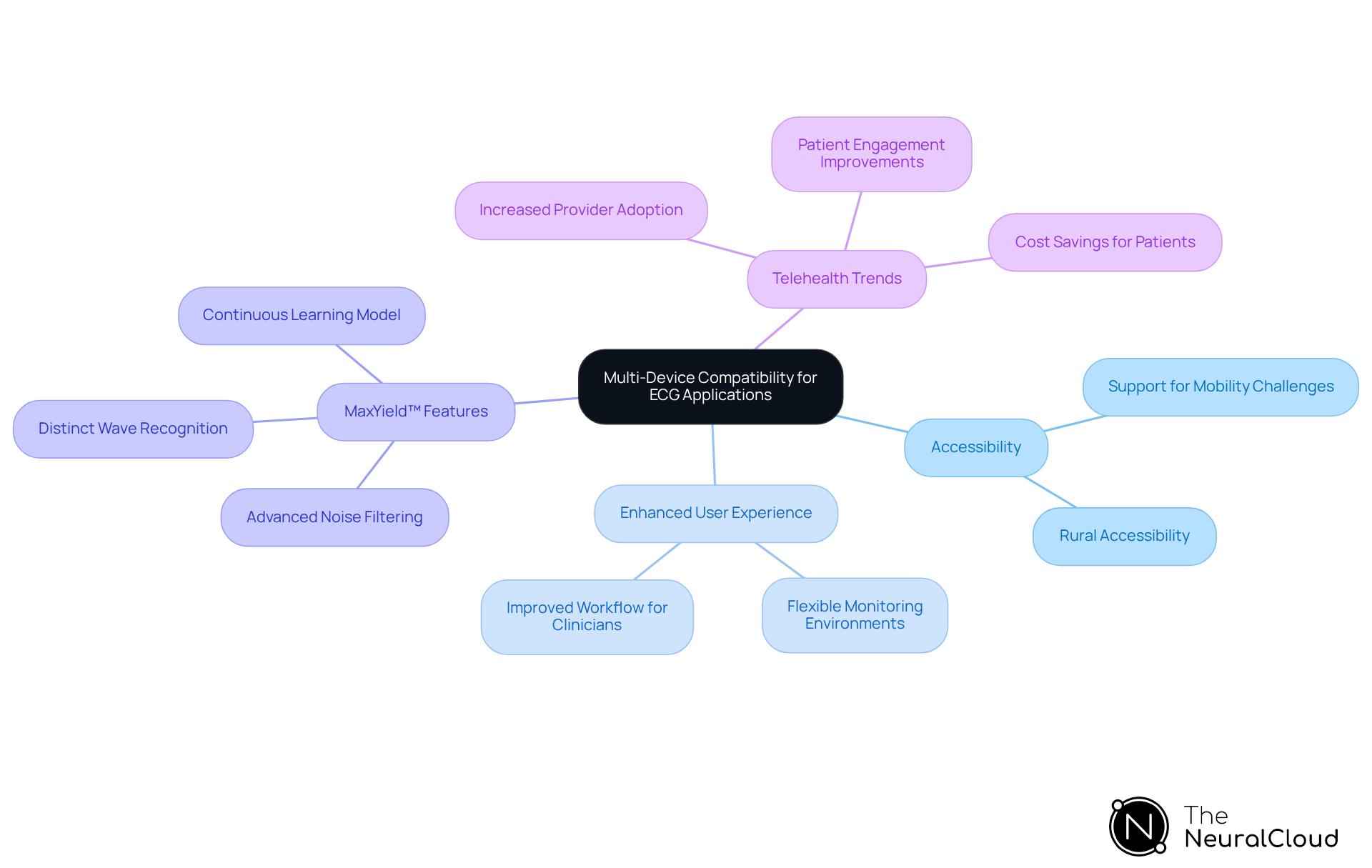
Conclusion
The development of EKG apps is fundamentally transforming cardiac care by integrating advanced technologies that enhance diagnostic accuracy and patient management. Essential features such as automated ECG analysis, real-time monitoring, user-friendly interfaces, and robust data security measures collectively contribute to a more efficient and effective healthcare environment. Leveraging these functionalities, health tech developers can create applications that streamline workflows and significantly improve patient outcomes.
Key insights from the article emphasize the importance of incorporating features like comprehensive reporting, customizable alerts, and seamless integration with healthcare systems. These elements ensure clinicians have access to precise and timely information, enabling informed decisions regarding patient care. Additionally, the focus on educational resources and cloud-based storage highlights the necessity for continuous learning and collaboration among healthcare professionals, fostering a culture of excellence in cardiac care.
As the landscape of health technology continues to evolve, adopting these essential features in EKG apps will be crucial. Developers are encouraged to prioritize innovations that enhance accessibility and responsiveness, ultimately leading to improved patient engagement and safety. Embracing these advancements can pave the way for a brighter future in cardiac health, ensuring both patients and healthcare providers benefit from the capabilities of modern EKG applications.
Frequently Asked Questions
What is MaxYield™ and how does it enhance ECG analysis?
MaxYield™ is a platform developed by Neural Cloud Solutions that automates ECG analysis, significantly improving the clarity of ECG signals by filtering out noise and accurately labeling critical features like P-waves, QRS complexes, and T-wave intervals. It can process over 200,000 heartbeats in under five minutes, enhancing diagnostic accuracy.
How does AI contribute to ECG analysis in MaxYield™?
AI in MaxYield™ allows for the detection of 20 essential diagnostic patterns from standard 12-lead ECGs, which surpasses traditional computerized interpretation methods. This advancement helps clinicians identify high-risk cases more quickly, improving safety and treatment effectiveness.
Why is real-time monitoring important for cardiac insights?
Real-time monitoring provides immediate feedback on a patient's cardiac status, allowing for the timely detection of arrhythmias and other abnormalities. This capability enables healthcare providers to intervene swiftly, improving patient outcomes.
What technologies enhance the efficiency of ECG analysis in the EKG app?
The EKG app utilizes advanced noise filtering and distinct wave recognition technologies like MaxYield™, which transform lengthy and noisy ECG recordings into clear signals. Automated labeling and continuous learning models also streamline the review process.
How does a user-friendly interface benefit healthcare professionals using the EKG app?
A user-friendly interface allows healthcare professionals to easily navigate complex information, featuring clear visualizations of ECG waveforms, intuitive navigation, and customizable dashboards. This enhances user experience and reduces the time spent interpreting data, enabling clinicians to focus on patient care.
What impact does an effective user interface have on clinician satisfaction and efficiency?
An effective user interface can increase conversion rates by up to 400% and is vital for 94% of users, leading to greater clinician satisfaction and efficiency in interpreting ECG data. Well-structured interfaces support accurate interpretation and foster improved clinical outcomes.
